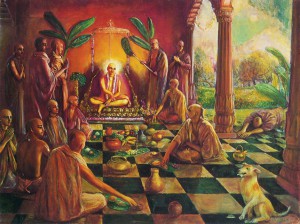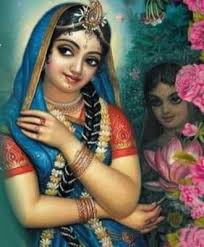Once, in the tales of the Panchatantra, there lived a poor but big-hearted brahmana. Despite his poverty, he was known for his generosity and kindness. Among his friends was a crane, who was greedy and always seeking ways to improve his lot without putting in much effort.
One day, the crane, driven by his insatiable greed, approached the brahmana and lamented, “O brahmana, I am in great distress. I have no food, no money, and I am in dire difficulty. Please help me.”
The brahmana, moved by compassion, said, “I know some rakshasas (demons) who live behind the forest. When I go to the forest to cut wood, I often encounter them. Although they are fearsome beings, I have made friends with them by offering them wood for their fires. They have become good friends of mine and have taught me a powerful mantra that can make one wealthy and free from want. Go to them, mention my name, and they will surely help you.”
The crane, driven by greed, followed the brahmana’s advice and went to meet the rakshasas. Initially, the rakshasas were ready to devour the crane, but the crane quickly mentioned the brahmana’s name. Upon hearing this, the rakshasas recognized the crane as a friend and spared his life.
“What do you desire?” the rakshasas asked.
The crane expressed his wish to learn the mantra that could bring him wealth. The rakshasas, true to their word, gave him the mantra. The crane, however, became consumed by his greed. He thought, “I must be the only one who knows this mantra, besides the brahmana. If I eliminate the brahmana, I will be the sole possessor of this powerful mantra.”
That night, the ungrateful crane killed the brahmana. With no one to share the secret of the mantra, the crane returned to the rakshasas, greedily seeking more from them.
However, the rakshasas, who possessed mystical powers, soon discovered that the crane had killed their friend, the brahmana. Furious and disgusted, they captured the crane and said, “You wretched creature! We should kill and eat you for what you have done. But we have a rule in our community: we never consume the flesh of an ungrateful person, for it would bring us immediate death. You have betrayed the one who helped you, so we will not touch you. Instead, we will hand you over to our cousins, the cannibals.”
The rakshasas took the crane to the cannibals and said, “Here is food for you, dear cousins.”
The cannibals, curious, asked, “Why don’t you eat it yourselves?”
The rakshasas replied, “This crane is an ungrateful wretch. He killed the man who gave him the power to improve his life.”
The cannibals shook their heads and said, “We may eat each other’s flesh, but even we have standards. We never eat the flesh of an ungrateful being. If we did, we would die as well.”
Thus, the crane, due to his ingratitude, was left to his fate, shunned by all.
Moral of the Story: Even rakshasas and cannibals, known for their fearsome nature, refuse to deal with an ungrateful person. Ingratitude is such a grave vice that it is universally despised, even among the most ruthless beings. The story teaches us the importance of gratitude and the dangers of being ungrateful. In the realm of bhakti (devotion), gratitude is the foundation. Without it, one cannot succeed in spiritual life or maintain peace of mind.
Srimad Bhagavatam Verse: The lesson of gratitude is echoed in the Srimad Bhagavatam (3.31.18):
“yenedrshim gatim asau dasha-maasya isha sangraahitah puru-dayena bhavaadrshena svenaiva tushyatu krtena sa deena-naathah ko naama tat-prati vinaanjalim asya kuryaat”
“My dear Lord, by Your causeless mercy, I am awakened to consciousness, although I am only ten months old. For this causeless mercy of the Supreme Personality of Godhead, the friend of all fallen souls, there is no way to express my gratitude but to pray with folded hands.”
Summary of Lessons:
- Gratitude as the Foundation of Spiritual Life: The journey of spirituality begins with the cultivation of gratitude. It is the starting point and the foundation upon which bhakti is built.
- Acceptance and Tolerance: By accepting our life situations as the result of our past actions, we cultivate tolerance. This acceptance allows us to see the hand of Krishna in everything.
- The Culture of Gratitude: Recognizing Krishna’s causeless mercy in our lives, we should always express our gratitude. This expression is shown through our actions, words, and attitudes, constantly saying “thank you” and “sorry” where needed.
Prayer:
“Dear Lord Krishna, thank You for all the blessings You have bestowed upon me. Thank You for the air I breathe, the food I eat, and the people in my life. Help me always to remember Your kindness and to be grateful to all living entities who help me in any way. Let my heart be filled with humility and gratitude, so I may always serve You with devotion and love.”
Hare Krishna, Hare Krishna, Krishna Krishna, Hare Hare Hare Rama, Hare Rama, Rama Rama, Hare Hare



